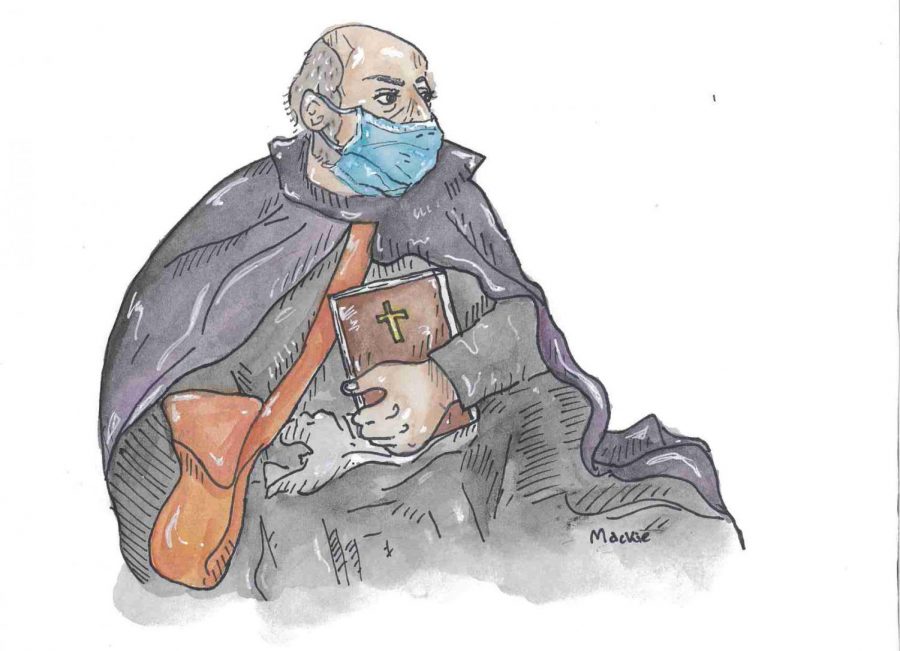Editorial: It’s on us to keep each other safe
September 3, 2020
We’re finally back. Some of us thought it was inevitable, some of us thought it was impossible. But whatever your individual expectations were, this new semester is starting with in-person classes, despite an ever-present pandemic and hurricane warnings.
In the past few weeks, we’ve already seen how quickly a COVID-19 outbreak can force a university that started in-person to go online, as schools such as the University of Notre Dame and the University of North Carolina at Chapel Hill turn to virtual classes for the rest of the semester. At Tulane, which started just a week before us, there are already dozens of cases Here at Loyola, there are at least 23 cases, and that number will no doubt rise in the coming days and weeks.
We’ve seen Loyola start this semester with a seemingly flippant attitude toward student health. We’ve had to deal with not one, but two crises threatening our safety, as the first days of classes were moved online because of Tropical Storm Marco and Hurricane Laura. Yet, communication we received from the school seemed tone deaf at times, as one email from the president’s office described the storms as “just another gift from the year 2020.” This may have been sarcastic, but students don’t want to hear jokes about our health and safety from our university’s leaders right now.
We need to be able to trust that our school is taking our health and safety seriously enough. We don’t want to hear about what abstract lessons we can learn from hurricanes, especially not on the fifteenth anniversary of Hurricane Katrina. We don’t want to hear about how we’ll tell our grandchildren stories about these events one day. Many of us aren’t even sure we’ll be alive to have kids, much less grandchildren.
The Loyola administration has also told us repeatedly that it is our responsibility to ensure the safety of ourselves and others. President Tetlow said in an email on the first day of classes that the decision to return to campus was “a decision to do right by our students and trust that they will protect us in turn.” We’re not sure that was the right decision for students’ sake, and the omission of any mention of the school protecting the students did not go unnoticed. It’s true that everyone has a responsibility to ensure the safety of those around them as best they can. But it’s also true that there’s only so much we can do as individuals to keep everyone safe. Health and safety on campus is a systemic issue. Ultimately, it is Loyola’s responsibility to make sure that we are set up in a way that promotes safety, and it doesn’t look like they’ve done that.
We’ll never know how bad an outbreak on campus truly is or how many people are asymptomatic carriers if we don’t have regular, mandatory testing. We don’t know how use of the symptom tracking app, Campus Clear, is going to be enforced, or even if it will be at all. We don’t know what criteria Loyola is going to use to decide whether or not an outbreak is bad enough to suspend in-person classes again. There are too many questions that have been left unanswered, and these are things that we deserve to know.
Nobody is quite sure what to expect, but there’s one thing that is already abundantly clear: to have any chance of making in-person classes work, we all need to take every safety measure seriously.
Tulane is conducting mandatory testing on a regular basis, with weekly testing for undergrads and twice weekly for those living on campus. Yet still, they are struggling to contain the disease on their campus.
Unlike Tulane, we won’t have any way of knowing how many cases we have on campus. While they test everyone on their campus on a regular basis, Loyola is making testing entirely voluntary. That’s one way you can be proactive in containing the coronavirus on campus: get yourself tested regularly. You don’t want to be spreading the virus without realizing it.
Wear a mask whenever you’re in public. Stay at least six feet away from others as much as you possibly can. Don’t go to parties. Don’t go to The Boot.
Most of us are young. Many of us probably feel invincible, but we’re not. More importantly, we will be interacting with many faculty, staff and other students who are at risk. Try your best not to get sick, and to not get anyone else sick. Loyola is only doing so much to protect us, and it likely won’t be enough.
The Loyola administration has had to make difficult decisions in the lead up to this semester, we recognize that. When the decision to return to campus was made, nobody could have known for sure if it would be safe to do so. Unfortunately, it now looks like it isn’t. We know that our leaders are smart and capable, and we trust that they made the best decisions they could using the information they had at the time. However, we also need to face the facts: it’s likely that this return to campus won’t work, and if it doesn’t, we need to be prepared. We all need to do our best to keep our friends and neighbors safe, but we need Loyola to do the same for us as well.







